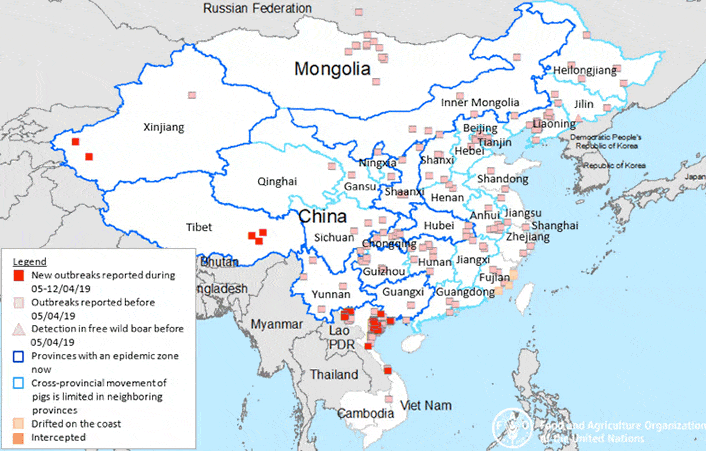Hot topics — African swine fever and anthrax
African swine fever on the move
African swine fever (ASF) is a severe viral disease that affects domestic and wild pigs. This transboundary animal disease can be spread by live or dead pigs, domestic and wild pigs, and contaminated pork products.
The virus can survive for months in raw and frozen pig meat, as well as some processed pig meats. If ingested these products can spread disease to other pigs.
Symptoms in pigs include:
- high fever
- loss of appetite
- shivering
- breathing abnormally
- coughing (sometimes).
There is no treatment for ASF infected animals and currently no commercially available vaccines.
China is the world's largest pork producer. According to National Bureau of Statistics of China in 2016, Yunnan in south-western China was the fifth largest pig-producing province, while its neighbouring province, Sichuan, was the largest in 2018. China was ASF free until the first case was reported in August 2018 in the north-eastern province of Liaoning and has spread throughout northern and central China, most recently diagnosed on Hainan Island off China's southern coast.
It is estimated that China's total swine inventory will decrease by 13 per cent to 374 million head in 2019. China has taken measures to control the situation by culling animals, banning the feeding of kitchen scraps to pigs, stopped transportation of live pigs from affected areas, and quarantined affected farms. To date, over 1 billion pigs have been culled. Recent reports indicate that the Chinese government is considering the eradication of backyard pig farming, a significant source of ASF virus transmission, which represents approximately 17 per cent of the world's production of pork. In March and April 2019, ASF was confirmed to have spread south to Vietnam and Cambodia.
The majority of ASF outbreaks that have occurred in previously ASF-free countries like China, Western Europe (Belgium), Mongolia and Vietnam have been traced to feeding contaminated waste derived from infected pigs to domesticated pigs. In November 2018, pork sausages, discarded by tourists at Kaohsiung International Airport in Taiwan were found to have been contaminated with the ASF virus. South Korea, Japan, and Thailand have reported similar cases recently, with ASF-contaminated sausages and other pork products transported illegally from China by travellers in their luggage.

See a map of the latest update on ASF in Asia.
The Australian Department of Agriculture and Water Resources has increased border surveillance activities, including testing pork products illegally imported by international travellers and sent into mail processing centres.
Imported pig products, such as pork jerky/biltong, sausages and un-canned meats (including vacuum sealed items) are not permitted to be imported as they pose a high biosecurity risk.
In many countries, food waste is used as a cheap source of feed for pigs. Food scraps or waste potentially contain viruses that cause and spread disease in animals and some of these viruses cannot be destroyed by cooking, freezing, chilling or curing.
Australia is currently free from diseases – such as foot and mouth disease and classical and African swine fever – and therefore swill feeding in Australia is illegal. An outbreak of these diseases would result in the slaughter of many pigs and immediate closure of markets for Australian livestock.
An outbreak of ASF in the Australian domestic pig population would have significant impacts on production and health and our export markets. Costs associated with controlling an incident, including slaughter, disinfection and movement controls, would also be substantial.
See African swine fever for more information about ASF spreading in eastern Europe and China and the ASF fact sheet.
Anthrax strikes again in Victoria and New South Wales
An outbreak of anthrax was reported in March in New South Wales involving 350 sheep deaths, with four sheep deaths reported in the Swan Hill district in Victoria. With recent warmer weather, Victorian veterinary practitioners are reminded to be vigilant when investigating sudden, unexplained deaths of cattle, sheep and other susceptible livestock.
Anthrax is an infectious bacterial disease of animals, caused by the spore-forming bacterium Bacillus anthracis. Although the disease usually appears during the warmer months, cases of anthrax may occur at any time of year and in locations where the disease may not have been recognised for many years. The weather and seasonal conditions occurring currently in Victoria are similar to those experienced prior to historic anthrax outbreaks.
Outbreaks occurred near Swan Hill in November 2018, March 2018 and March 2017 and anthrax occurs sporadically in the Goulburn Valley. The disease has also recently occurred interstate, with cases reported in Southern Queensland in March 2017 and in October 2017 through to January 2018, and in New South Wales in February 2017, May 2018 and September 2018.
Field testing of cattle and sheep carcasses can be carried out by private veterinary practitioners using a hand-held immunochromatographic test (ICT) kit. Please contact your local Agriculture Victoria staff to provide you with the ICT kits and training on how to use these kits.
It is vital that, if you are made aware of sudden deaths of ruminant livestock without an obvious cause, you:
- report the incident immediately to your local Agriculture Victoria staff
- do not move the carcass(es)
- test carcass(es) for anthrax using an ICT.
Agriculture Victoria provides funding to private veterinarians for a basic anthrax exclusion in cattle and sheep and also for investigations undertaken as part of the ICT sheep validation project.
More information regarding available subsidies can be found on the page Significant Disease Investigation (SDI) program.